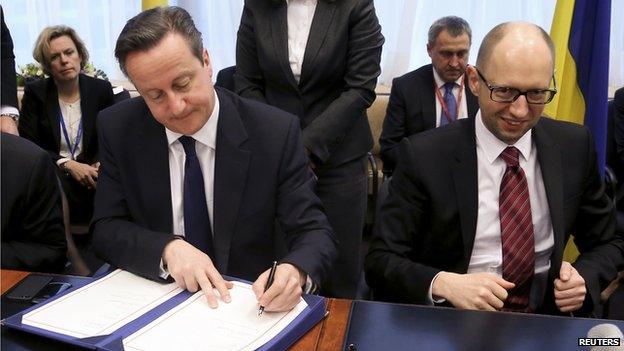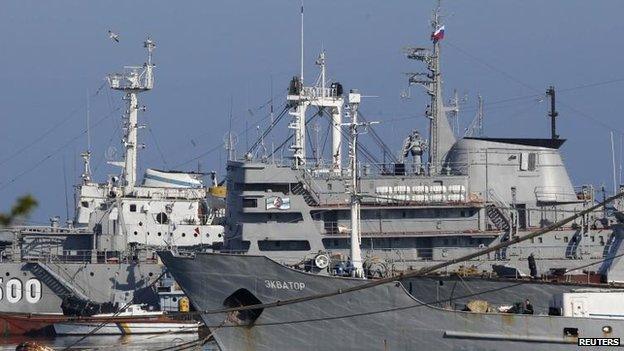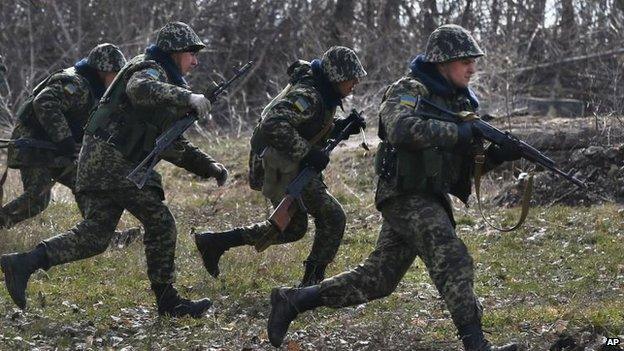Ukraine crisis: EU signs association deal
- Published
Acting Ukraine PM Yatsenyuk: "This treaty shows Ukraine shares European values"
The EU and Ukraine have signed an agreement forging closer economic ties, in a show of support following Russia's annexation of Crimea.
Former Ukrainian President Viktor Yanukovych's abandonment of the EU deal in November triggered protests, his removal and Russia's move into Crimea.
EU leaders have also agreed to try to reduce energy dependence on Russia.
In Moscow, President Vladimir Putin signed a law formally absorbing Crimea into Russia.
The EU and the US have announced sanctions on several high-ranking Russian figures, targeting Mr Putin's inner circle.
Full details of the latest EU targets are due to be published shortly.
Russian shares fell sharply on Friday as investors considered the impact of the Western sanctions on Russia's economy.
'Rule of law'
The EU Association Agreement with Ukraine is designed to give the country's interim leadership under PM Arseniy Yatsenyuk economic and political support.
EU President Herman Van Rompuy said in a statement , externalthat the accord "recognises the aspirations of the people of Ukraine to live in a country governed by values, by democracy and the rule of law".
The political parts of the accord were signed in Brussels on Friday; the economic and trade sections will not be signed until after Ukrainian presidential elections in May.

David Cameron and Arseniy Yatsenyuk were among those signing the deal in Brussels on Friday

A Russian flag flies on a Ukrainian ship moored in the Crimean port of Sevastopol

Ukrainian border guards train in the village of Alekseyevka on the Ukrainian-Russian frontier
Mr Yatsenyuk said this was a "historic day", adding: "We want to be a part of the big European family and this is the first tremendous step in order to achieve for Ukraine its ultimate goal, as a full-fledged member."
He added that "the best way to contain Russia is to impose real economic leverage".
Speaking at the end of the summit in Brussels, German Chancellor Angela Merkel said she was returning home "very happy," as European leaders had been able to find a joint position on the Ukraine crisis.
UK Prime Minister David Cameron said that the best rebuke to Russia would be a strong and successful Ukraine.
Mr Cameron described Sunday's referendum in Crimea as a "sham", saying it took place "at the barrel of a Kalashnikov".
Trade issues
The most sensitive issue of trade integration with the EU is as yet unsigned.
But in its Conclusions on Ukraine, external, published on Friday, the EU said it was committed to signing the remainder.
The EU also said it would push ahead with similar co-operation deals with two former Soviet republics - Georgia and Moldova - in the summer.
Moscow has troops in breakaway parts of Georgia and in Trans-Dniester, which broke away from Moldova, and our correspondent says the EU's announcement on this is likely to infuriate the Kremlin far more than any sanctions imposed so far.
The EU has also cancelled a summit with Russia in June and said member states would cancel regular bilateral summits.
Sanctions broadened
Friday's signing came as the EU broadened its sanctions over Russia's annexation of Crimea.
It added 12 individuals to an earlier list of 21 who now face asset freezes and travel bans.
The US on Thursday added to its own list and also targeted the Rossiya bank.
President Putin said after talks with officials in Moscow that he would not take immediate reciprocal action.
"I think we should refrain from taking steps in response for now," Interfax quoted Mr Putin as saying.
Regarding the US sanctions on Rossiya bank, Mr Putin said: "I personally did not have an account with it but will open an account there on Monday for sure."
The BBC's Chris Morris meets people who have been camped in Kiev's Independence Square for over a month
Two credit rating agencies have now downgraded Russia's outlook to negative from stable.
After signing the law completing Crimea's accession to the Russian Federation, Mr Putin said: "We have a lot of work ahead to adapt Crimea to Russian legislation... I ask deputies of both chambers to do their best in the interests of all Russians and of Crimeans especially."
Earlier all 155 senators present in the upper house of Russia's parliament voted to ratify the treaty.
Addressing the house, Foreign Minister Sergei Lavrov said any reference to annexation was an insult to "people, to their inalienable rights to self-determination, which they have exercised to the full".
Ukraine's interim President Olexander Turchynov, after meeting UN Secretary General Ban Ki-moon on Friday, said Kiev would never accept a Crimea that was not part of Ukraine's sovereign territory.
Mr Ban said that he had told President Putin in talks on Thursday that the crisis could only be solved through peaceful negotiations, based on the UN charter and respect for the sovereignty of Ukraine.
He urged both sides to avoid "inflammatory rhetoric" and to control "radical elements".
A UN team under envoy Ivan Simonovic has now arrived in Crimea to discuss setting up a UN human rights monitoring mission in the region.

Are you in Crimea or the wider region? What are your thoughts on recent events? Email us at haveyoursay@bbc.co.uk with the subject heading 'Crimea'.